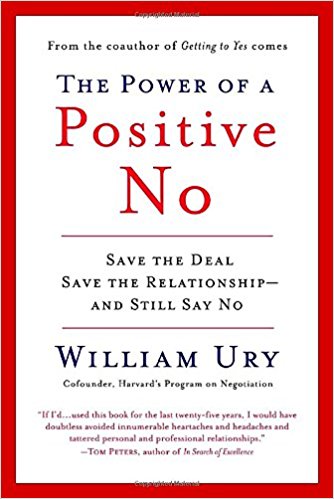The Power of a Positive No Summary
5 min read ⌚
 Save The Deal Save The Relationship and Still Say No
Save The Deal Save The Relationship and Still Say No
Sometimes companies have to deal with complex situations without any guidance.
Top-notch managers and other executives can say no – but mean yes. It is an indispensable skill for any good motivator.
Who Should Read “The Power of a Positive No”? And Why?
The inner electricity not only that it generates vibes which the interlocutors interpret them as negative but also, it doesn’t give you anything. Seek advice, leave your stubbornness aside, acknowledge the fact that you are not the smartest person out there.
It irritates people when you behave like that, referring to an attitude which reflects self-reliant egoistic approach without any principles or norms.
Start the day with a “Yes!” present the facts and how they are beneficial for everyone. Share the common interests and believe in the author’s navigational tools.
The previous yes must be followed by a “No.” This attitude will show your greatness and ability to defend your perspective. Then invite once again the “Yes” and transform any problem into a positive conclusion. Now you can really grasp, why is this book fits everyone.
About William Ury
 William Ury is an American-born academic, negotiation expert and an author.
William Ury is an American-born academic, negotiation expert and an author.
He was born on September 12th, 1953 in the U.S. Currently William is in charge of the Harvard University’s Global Negotiation Project.
Despite being the leader of global “e-Parliament, he has also co-authored a book called – Getting to Yes.
His words are indeed an inspiration to the modern democratic society with solutions that address dozens of global problems.
“The Power of a Positive No Summary”
Do you want to hear an eye-opening story? – Let’s roll.
One senior executive was forced to spend a lot of time in the air (traveling). The circumstances led him to devastating health issues as a result of the many meals eaten in hundreds of different restaurants. It wasn’t food poisoning; his heart condition got worse to a point where he couldn’t eat anything prepared with either oil or butter.
The risk was high, perhaps even life-threatening, according to the doctors. Every time the executive ordered something to eat, he would lay out specific instruction on the food-preparing process.
The goal was to make sure that none of the food serving in the restaurant for him, had oil or butter. For the majority of times, his request was ignored, due to the unwillingness of the restaurant to prepare a special meal for an “unspecial” guest.
Considering the seriousness associated with a special treatment – something had to be one. Restaurants started losing their temper with this troublemaker, leading to a life-or-death kind of situation. The executive realized that if he contributes to the fire, the cooks will behave even worse and his demands will not be satisfied.
Instead, he began looking for a creative way to overcome this problem. The solution was simple – whenever he received food prepared with oil or butter, he immediately drew a picture of his cardiovascular system on a napkin, explaining the importance of his request.
He always repeated the same phrase (politely) – “My doctors say if I have any butter or oil, I’ll die,”
This story or life-altering experience is a key indicator of how to deal and forge healthy relationships with others for your sake. Leave your ego aside for a moment, and analyze the surroundings – perhaps the day will come when you’ll intuitively handle such problems.
Take another situation for example – How would you deal with a violent man who plans to kill his entire family because he lost his job? In this case, you are the police chief or the negotiator and suddenly you’re witnessing an unemployed, desperate man who’s holding his wife and children hostage.
For exchange of the life of his family, he requests the boss who fired him (without warning), so he can “administer justice.”
How to handle this potential cold-blooded murder without endangering any civilians in or outside the house? Put your “No” skills to the test!
The Positive “No” is a useful skill, even in a non-life-threatening situation. The author of “The Power of a Positive No” – William Ury is a powerful negotiator who ended bloody conflicts in all parts of the world.
Here, he pinpoints a subtle tactic for handing over a “Positive No” regardless of the circumstances. This flexible approach will enable you to become a strong individual, a person with integrity who’s not afraid to present its opinions.
Key Lessons from “The Power of a Positive No.”
1. Don’t interpret, discuss facts
2. Make up your mind “Yes or No”?
3. Leave your anger aside
Don’t interpret, discuss facts
Sometimes your expertise wouldn’t come in handy, and you have to use the power of intuition. If your team is inefficient regarding production or creativity, express the facts which led you to the conclusion.
Don’t interpret the situation. Otherwise, you’ll become that “bad boss” who interfere too much. Understand the importance of a proper-working environment – the benefits are enormous.
Make up your mind “Yes or No”?
Many people look at “No” as a tool for expressing negativity. In fact, the saying of it indicates a lot more than that.
To forge strong bonds with other persons, you need to maintain a “No” on a regular basis. A person without self-trust can never be taken seriously.
Leave your anger aside
People often have requests which are by all means unacceptable. Many refer to them as unfair demands.
The ability to transform them just by explaining yourself is essential. Choosing anger as a tool for that purpose is a disastrous policy. Be humble, and people will treat you in the same way.
Like this summary? We’d Like to invite you to download our free 12 min app, for more amazing summaries and audiobooks.
“The Power of a Positive No” Quotes
As Martin Luther King Jr. once said, “Our lives begin to end the day we become silent about things that matter. Share on X The other often much prefers a clear answer, even if it is No, then continued indecision and waffling. Share on X When angry, count to 10. If very angry, 100. Share on X To get your No heard, there is no need to shout. There is no need to be aggressive, nor is there need to placate. A firm neutral tone will do just fine. Share on X All too often we cannot bring ourselves to say No when we want to and know we should. Share on XOur Critical Review
This is not another self-help books whose purpose is widely known. The author designed it to answer questions related to self-management which is not the same as self-satisfaction.
If you’re excited to learn more about “The Power of a Positive No” stay firm, don’t back down when you’re dealing with a dangerous situation. We as people have a habit to overreact, instead of approaching the problem carefully, we rush into conclusion.
Emir is the Head of Marketing at 12min. In his spare time, he loves to meditate and play soccer.


 Save The Deal Save The Relationship and Still Say No
Save The Deal Save The Relationship and Still Say No




